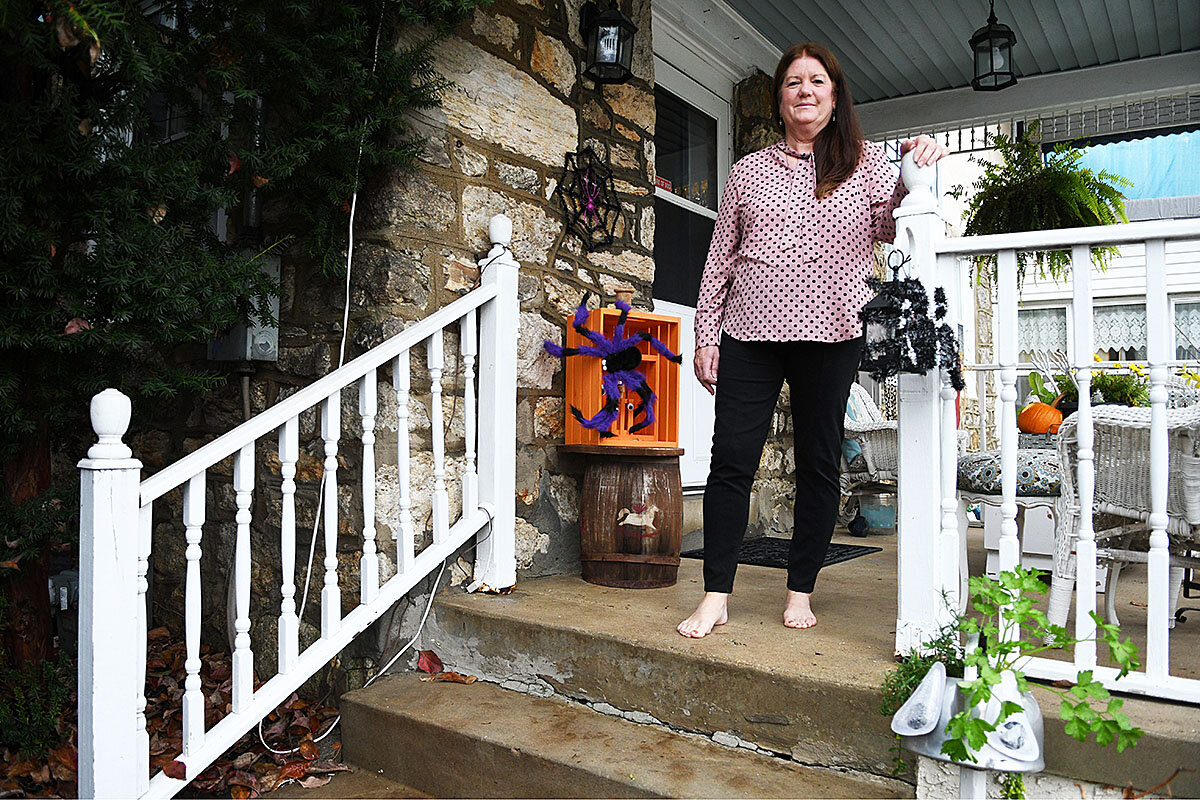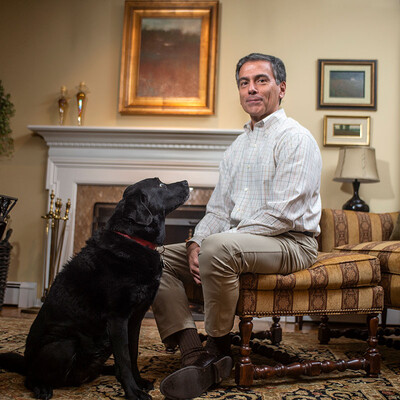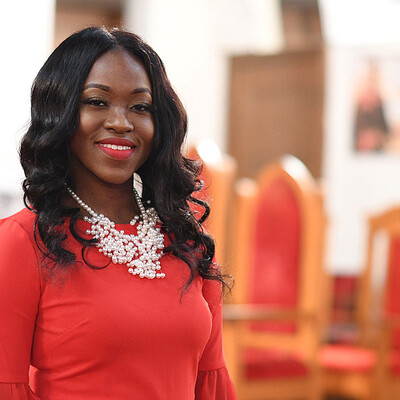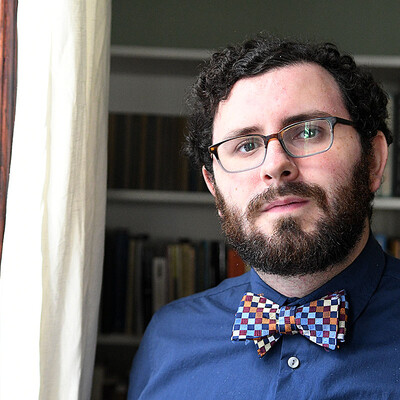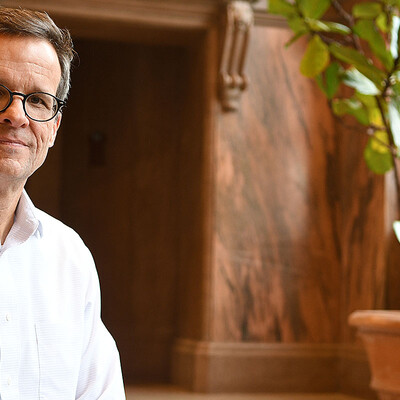One woman embraces Third Commandment in feeding 1,600 at Thanksgiving
Loading...
| Upper Darby, Pa.
Debbie Hadden is not one to take the Lord’s name in vain, especially not in November, when she’s got more than 1,600 mouths to feed on Thanksgiving Day. Not that there aren’t plenty of excuses for slipping up, given the immensity of the task and its attendant glitches – the outdated lists, the telephone tag, the last-minute head-count changes. And not to mention her own bad knees and bum shoulder.
When Ms. Hadden calls on the Lord, especially this month, it’s legit. She tells Him what she needs – about the fact that she’s way short on turkey, for instance – and then she watches to see what happens. She knows she’s been heard when a stranger pulls up in a pickup truck asking if she could possibly use a load of turkeys that the local food bank turned away. “If someone doesn’t believe in God, all they have to do is become involved in Thanksgiving,” says the unassuming Ms. Hadden in her comfy Upper Darby living room, the seedbed for her many works of charity.
Ms. Hadden spoke recently about the Third Commandment, Thou shalt not take the name of the Lord thy God in vain; for the Lord will not hold him guiltless that taketh his name in vain (Exodus 20:7). The conversation was part of the Monitor’s series examining the ways traditional religious codes like the Ten Commandments continue to matter in the lives of ordinary people.
Why We Wrote This
Debbie Hadden says she’s not always an exemplar of reverence. But for her, that faith-rooted quality is a foundation for good works. Part 4 in a series looking at the Ten Commandments through modern lives.
Ms. Hadden has been married for 36 years, the affable mother of two grown children. She’s also a longtime leader at First Presbyterian Church of Glenolden, where she has worshipped since age 12 and which serves as the staging ground for the Thanksgiving dinner project that Ms. Hadden and her family began 26 years ago.
The former nurse had an incident nearly 20 years ago with a detoxing hospital patient that left her disabled. Nevertheless, her default mode remains one of helping, whether it’s cutting out paper butterflies for local children’s programs or persuading a reluctant widower to join in Thanksgiving dinner. All the while, she wants her words not only to reflect the respect and reverence she has for God, but also to encourage others in the normal bumps and stumbles inherent in a spiritual journey. Her marching orders come from Matthew 25, she says, paraphrasing, “Whatever you’re doing for someone else, you’re doing for God.”
The dinner’s beginnings
Ms. Hadden’s most visible good work would have to be her Thanksgiving. It began a quarter century ago when, within two short years, her brother-in-law, Bob Teta, lost his mother, father, and young sister. Shortly thereafter, moved in his grief by the face of a homeless man he passed on the street, Mr. Teta asked his family, “Do you think there’s something we can do for Thanksgiving?”
There was. A mail carrier, he as well as his fellow workers began to ask shut-ins along their delivery routes if they’d like to receive a free Thanksgiving dinner. That year, they delivered 50 meals and fed 50 more people at a sit-down meal at their Glenolden church. After that, word-of-mouth took over, and others came forward – some for food, some to help. By last year, what had begun as a small family gesture fed more than 1,600 needy people in their homes and another 170 at a sit-down meal at the church – with Ms. Hadden working from lists provided by hospitals, senior centers, hospices, social workers, food pantries, and friends.
Though the project has become a well-oiled machine over the years, its success is in God’s hands, Ms. Hadden says, and each year’s unfolding affirms her faith in a God who is intimately involved in the details. “I just leave it up to Him. He always sends me what I need,” she says.
Over the years, the siblings, children, and friends they corralled to help have become a volunteer force in the hundreds. “The Girl Scout troops come, the Boy Scout troops. ... A bunch of guys from a group home once carried all the boxes to the cars,” Ms. Hadden recalls. “The Holy Spirit has touched people from all over Delaware County and put that in their hearts, put that in their heads, maybe even tormented them a little bit, and the next thing you know, I’m getting calls from people I never heard of before who want to help.”
“When we use the Lord’s name, it should just be used for goodness,” says Edith Cain, who in her 90s is the oldest member of First Presbyterian. She was also its first woman elder and Ms. Hadden’s Sunday school teacher many years ago. Of the fact that she may have played a role in the family’s charitable nature, Ms. Cain says, “I’m thankful for that.” Like her former student, she believes kindness is contagious: “It’s amazing what sharing just a little bit of love to somebody else can do. Even if we just give each other a ‘hello, and how are you?’ Sometimes all a person needs is encouragement.”
Not always smooth sailing
Though somehow the canned goods appear, the pies get cut, and the yams parceled out, Thanksgiving is not always smooth sailing. “Every year the devil tries to get you. Every year the printer goes or Bob gets a flat tire or the computer goes down,” Ms. Hadden recalls. “The evil one puts these things in our path to stop us. The closer you are to doing God’s will, the devil’s going to try to get you.”
In a world where the Lord’s name is taken lightly time and again – even in Ms. Hadden’s own house on certain Sundays when the Eagles are playing – she doesn’t judge, but she may chide. “It’s wrong. The Bible tells us not to do that,” she says. She admits she slips up from time to time herself, and will apologize. “I’m human. I say, ‘I’m sorry, God.’” To those within earshot, she’ll say, “Excuse my French,” and move on. She’s willing to be an example not just of inspiration but of imperfection. She believes those who witness her wrongdoing might benefit, in a way, by knowing that the woman they may see as holier-than-thou is, in fact, as human as they are.
Though the Third Commandment says those who use God’s name in vain will not be held guiltless, Ms. Hadden doesn’t wallow when she misses this – or any other – mark, and she doesn’t want others to wallow, either. “Your thoughts are reflected in your life. You don’t want to walk around carrying guilt. You move on, do positive things,” she says. She gives the hundreds who pitch in at First Presbyterian on Thanksgiving morning a chance to do just that, with them leaving every bit as nourished as those who are fed.
“They’re so glad they did this thing,” Ms. Hadden says. “They feel so good about themselves, that they were able to help people. They go home and talk to their neighbors, their friends, their families. There’s a ripple effect.”
Part 1: The Commandments as a moral source code in modern life
Part 2: How does the First Commandment fit in today?
Part 3: ‘I have to have humility’: How Second Commandment helped man find freedom
Part 4: One woman embraces Third Commandment in feeding 1,600 at Thanksgiving
Part 5: ‘Remember the sabbath’: How one family lives the Fourth Commandment
Part 6: ‘Growing up is hard’: How Fifth Commandment guided a child during divorce
Part 7: Is saying ‘I’d kill for those shoes’ OK? One woman and Sixth Commandment.
Part 8: Is chastity old-fashioned? An NFL veteran’s take on Seventh Commandment.
Part 9: ‘Thou shalt not steal’: Even someone else’s joy, says one educator
Part 10: ‘Thou shalt not bear false witness’: Ninth Commandment goes to Princeton
Part 11: Jealousy at Ivy League level: How a law professor views Tenth Commandment






